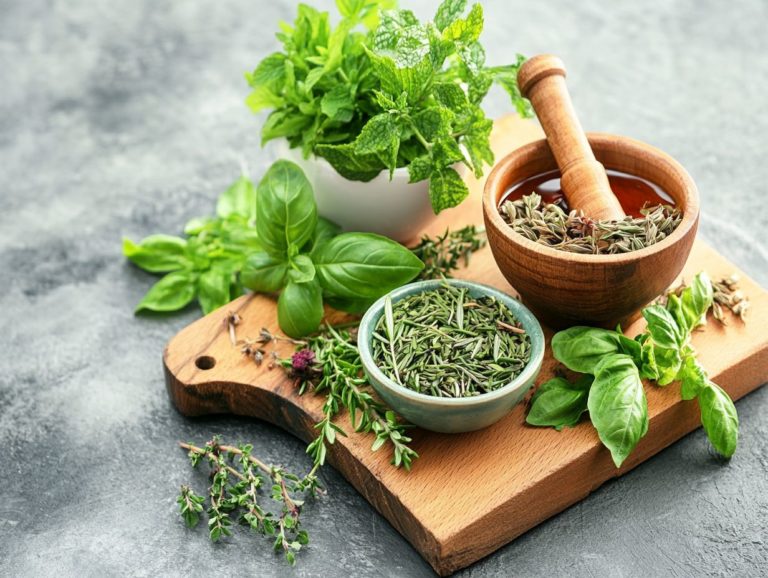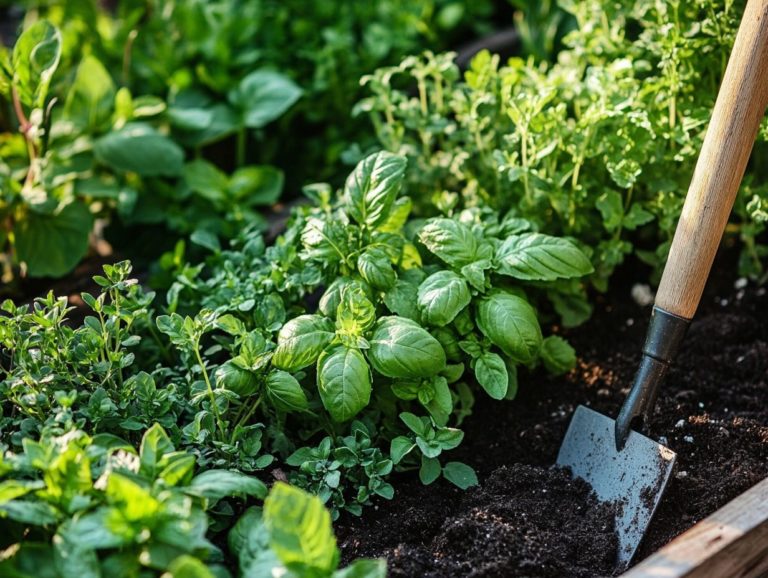Understanding the History of Herbal Medicine
Herbal medicine has a rich history that spans thousands of years. It is intricately woven into the cultures of ancient civilizations.
From its early applications as remedies for various ailments to its evolution through prominent figures and global adaptations, herbal medicine is significant.
The modern resurgence of herbal medicine is also supported by scientific advancements that enhance the credibility of traditional practices, allowing it to coexist harmoniously with conventional medicine.
Unlock the secrets of herbal healing and discover the timeless wisdom that resonates through history!
Contents
Key Takeaways:

- Herbal medicine has been used since ancient times by various cultures and remains popular today.
- Key figures have shaped traditional herbal medicine, adapting it to different cultures globally.
- Modern herbal medicine has gained acceptance due to scientific advancements and its integration with conventional practices.
The Origins of Herbal Medicine
The origins of herbal medicine trace back thousands of years, revealing a rich tapestry woven with ancient medicinal wisdom across various civilizations and cultures. Each has contributed unique insights into the healing properties of medicinal plants.
Consider the Ebers papyrus of ancient Egypt, a remarkable document detailing the use of herbal remedies. Also, the teachings of Hippocrates underscored the significance of natural healing. The foundations of herbalism have been shaped by diverse traditions, including Ayurveda a traditional Indian system of medicine focusing on balance in the body and traditional Chinese medicine, each promoting holistic health and well-being.
Early Uses and Practices
Early uses of herbal medicine involved tapping into a wealth of traditional remedies derived from medicinal plants, discovered and embraced by ancient peoples for their remarkable healing properties.
Through keen observation and an unyielding thirst for knowledge, early herbalists experimented with plants like chamomile for its soothing effects and willow bark as a reliable pain reliever. Their methods, often a product of trial and error, reflected a profound relationship with the natural world. This invaluable knowledge flowed seamlessly between generations, evolving through storytelling and practice.
In this way, herbalism became an essential component of traditional medicine not just for treating ailments, but for cultivating community and deepening the connection to the earth.
Influence of Ancient Civilizations
The influence of ancient civilizations on herbal medicine is profound. Practices from cultures such as the Egyptians, Greeks, Indians, and Chinese have intricately shaped the foundational elements of herbalism you recognize today.
Take the Egyptian Ebers Papyrus, for instance, dating back to around 1550 BCE. This remarkable document stands as one of the earliest written records of herbal remedies, detailing over 700 medicinal plants and their applications for treating various ailments.
Then there s Hippocrates, often hailed as the father of modern medicine. He emphasized observation and the therapeutic properties of plants in his teachings, laying the groundwork for a more methodical approach to herbalism.
In India, Ayurveda weaves herbs into a holistic framework for health, highlighting the importance of not just physical well-being but also mental and spiritual harmony.
Meanwhile, Traditional Chinese Medicine, an ancient medical practice that incorporates herbal treatments and holistic principles, combines herbal formulations with concepts like yin and yang. This illustrates how these ancient societies possessed a profound understanding of nature s power in promoting healing and balance.
Development of Traditional Herbal Medicine
The evolution of traditional herbal medicine has undergone remarkable transformation over the centuries. This journey is marked by the invaluable contributions of key figures and the seamless integration of indigenous practices from diverse cultures.
As a result, you now encounter a rich tapestry of herbal remedies utilized across the globe, each reflecting the unique heritage and wisdom of its origins.
Key Figures and Contributions
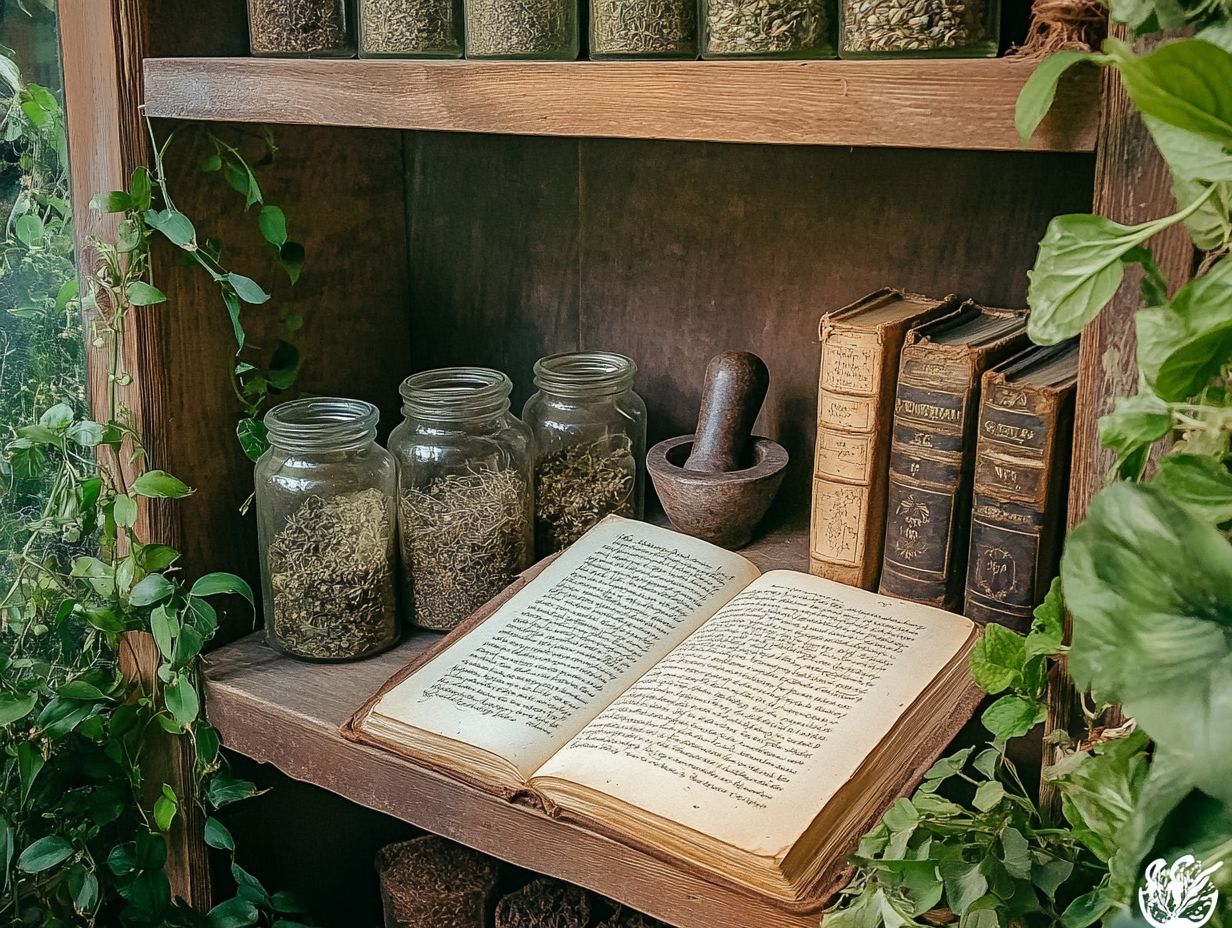
Several influential figures have shaped the field of herbal medicine, including healers and scholars like Hippocrates. His writings highlighted the natural properties of plants, alongside practitioners from traditional Chinese medicine and Ayurveda, who have significantly enriched herbal knowledge.
Hippocrates, often regarded as the ‘Father of Medicine’, set the stage for understanding the medicinal uses of herbs. He championed a holistic approach to healing.
Meanwhile, traditional Chinese medicine practitioners, such as Zhang Zhongjing, propelled the field forward with their deep insights into herbal combinations and the intricate balance of energy within the body.
Equally vital, Ayurvedic scholars drew from ancient texts, providing invaluable perspectives on the healing properties of herbs tailored to individual constitutions.
Together, these remarkable figures have established a robust foundation that continues to shape contemporary practices worldwide.
Global Spread and Cultural Adaptations
The global spread of herbal medicine reveals a captivating tapestry of cultural adaptations. Here, indigenous knowledge beautifully intertwines with modern practices, enriching the realm of herbalism.
Discover how various regions adapt herbal practices to their unique environments! This journey illustrates how different areas customize their approaches to align with local climates, flora, and traditions.
For instance, while Asian cultures have long relied on herbs like ginseng and turmeric, Western herbalism has embraced plants such as echinacea and dandelion.
As these practices have evolved, the integration of indigenous techniques has deepened the understanding of each herb s potential. This synthesis not only enhances the efficacy of herbal remedies but also elevates the role of traditional healers in contemporary health discussions.
By doing so, it ensures that invaluable indigenous wisdom continues to inform and inspire modern herbal practices.
The Rise of Modern Herbal Medicine
The emergence of modern herbal medicine is characterized by remarkable scientific advancements and a transformative shift towards evidence-based practices, which means using scientific research to support health remedies.
Scientific Advances and Standardization
Scientific advances in herbal medicine have ushered in a new era of standardization for herbal products, making sure all products are the same quality and ensuring they adhere to stringent safety and efficacy standards.
This transformation is vital, as it fosters public trust and motivates healthcare professionals to consider herbal remedies with greater seriousness. Regulatory bodies have crafted comprehensive frameworks that guide the development, testing, and marketing of these products, empowering you to make informed choices.
The guidelines are specifically designed to evaluate potential interactions, side effects, and overall effectiveness. They highlight the critical need for thorough safety testing and efficacy assessments.
These measures not only safeguard users but also affirm the therapeutic potential of herbal medicine, effectively bridging the gap between traditional practices and contemporary healthcare standards.
Integration with Conventional Medicine
The integration of herbal medicine with conventional medicine has gained significant traction, especially in managing chronic health issues. Healthcare providers are increasingly recognizing the potential benefits of combining both approaches.
This shift embodies a broader trend toward whole-person care, where treatment plans are meticulously personalized to ensure you receive comprehensive support.
Practitioners are becoming more open to exploring herbal remedies alongside standard pharmaceutical options, seeing them as valuable tools to enhance patient outcomes.
This collaboration enriches the therapeutic arsenal available to practitioners and empowers you to take an active role in your own healing process.
As more studies unveil the efficacy of certain herbs, the dialogue between herbalists and conventional medical professionals becomes essential for bridging knowledge gaps. This ensures that treatments are safe, effective, and tailored to your individual needs.
Current State of Herbal Medicine
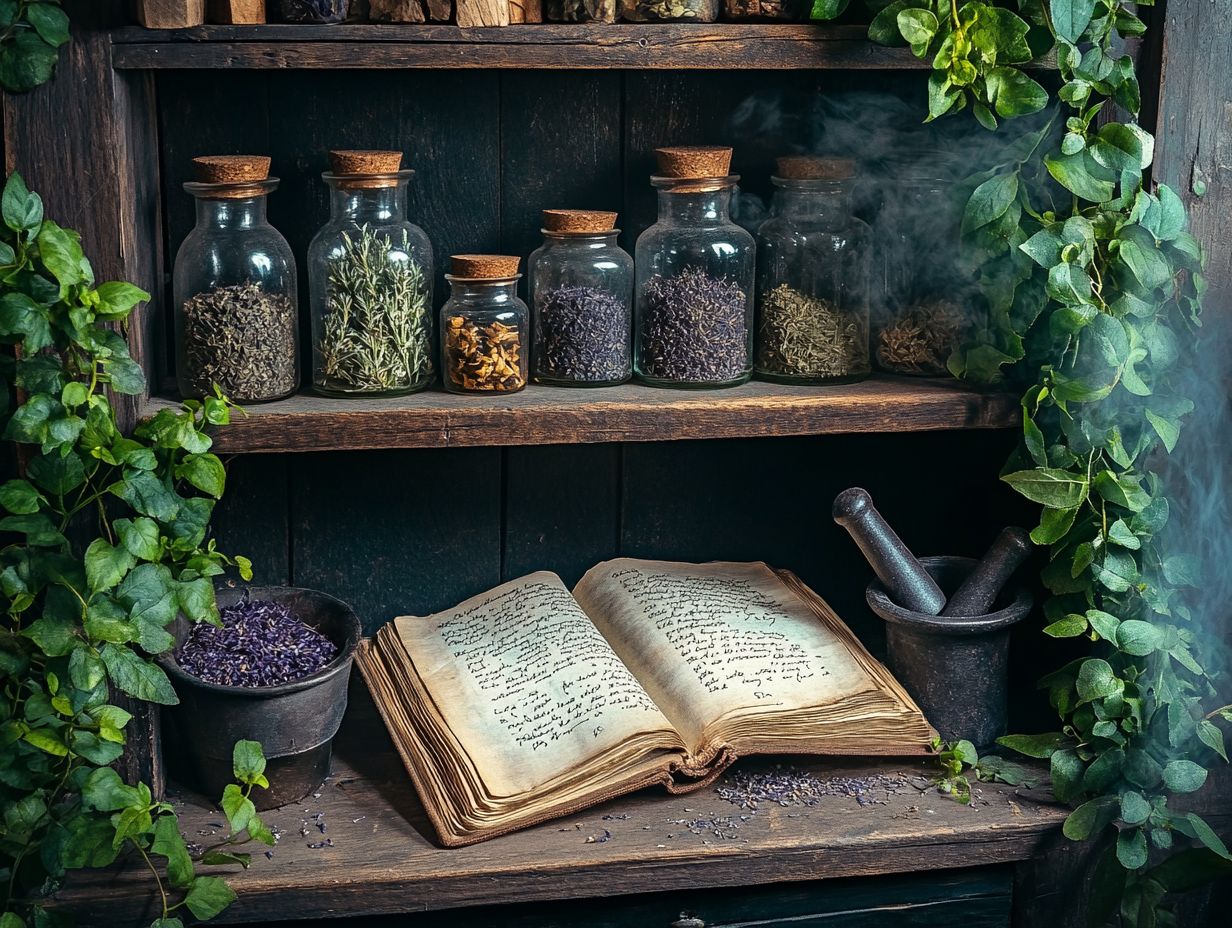
The current state of herbal medicine presents a dynamic landscape marked by a surge in global usage, emerging market trends, and ongoing regulatory developments that address safety concerns linked to herbal products.
Global Usage and Market Trends
In recent years, there has been a remarkable surge in the global usage of herbal medicine. Market trends indicate a growing consumer preference for natural and holistic remedies.
This shift stems from key factors, including growing concern about the side effects of conventional medicines and increased interest in preventive healthcare. Many individuals are now actively seeking alternatives that target specific ailments and enhance overall well-being.
Social media and wellness influencers have played a vital role. They educate the public about various herbal options, increasing demand for these traditional remedies.
As a result, the herbal remedies sector is witnessing innovative product formulations and improved accessibility, marking a transformative period in consumer health choices.
Regulation and Safety Concerns
Regulation of herbal medicine is essential for ensuring safety. Various countries are creating frameworks to tackle safety concerns and mitigate risks associated with herbal products.
In the United States, the FDA oversees the herbal supplement industry. It creates guidelines that manufacturers must follow to ensure product safety. However, the lack of stringent pre-market approval processes can pose challenges in assessing the efficacy and safety of these products.
International organizations have also developed their own standards and protocols, influencing how practitioners use herbal remedies. Understanding these regulations is crucial for both practitioners and consumers searching for effective herbal solutions. Knowing potential adverse effects will empower you to make better healthcare decisions now.
Frequently Asked Questions
What is herbal medicine?
Herbal medicine refers to using plants and plant extracts for medicinal purposes. It is a traditional form of medicine that various cultures have used for centuries.
What is the history of herbal medicine?
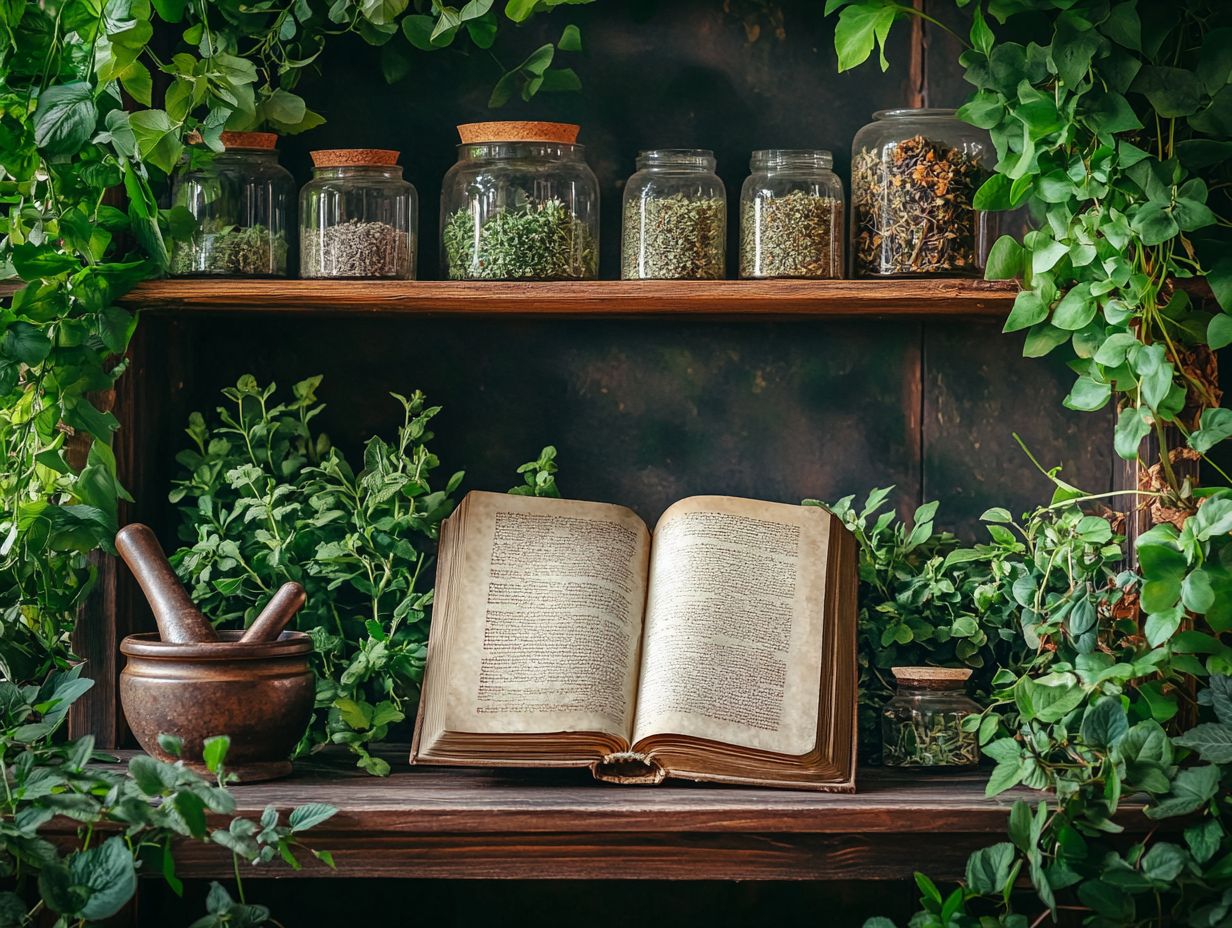
The use of herbal medicine dates back to ancient civilizations such as the Egyptians, Chinese, and Greeks. It has been practiced for thousands of years and continues to be relevant today.
What are some common herbs used in herbal medicine?
Commonly used herbs include ginger, turmeric, ginseng, garlic, and chamomile. These herbs possess various medicinal properties and are used to address a wide range of health conditions.
How has herbal medicine evolved over time?
Herbal medicine has evolved from a traditional practice to a more scientific, evidence-based approach. Modern herbal medicine involves standardized extracts, clinical trials, and quality control measures to ensure safety and efficacy.
What are the benefits of herbal medicine?
Herbal medicine offers a natural and holistic approach to healing with minimal side effects. It can also be more affordable than conventional medicine. Many herbs have strong medicinal properties that effectively treat various health conditions.
Is herbal medicine safe?
When used correctly and under the guidance of a trained practitioner, herbal medicine is generally considered safe. However, it’s important to consult with your healthcare provider before starting any herbal remedies, especially if you are taking medications or have underlying health conditions.



